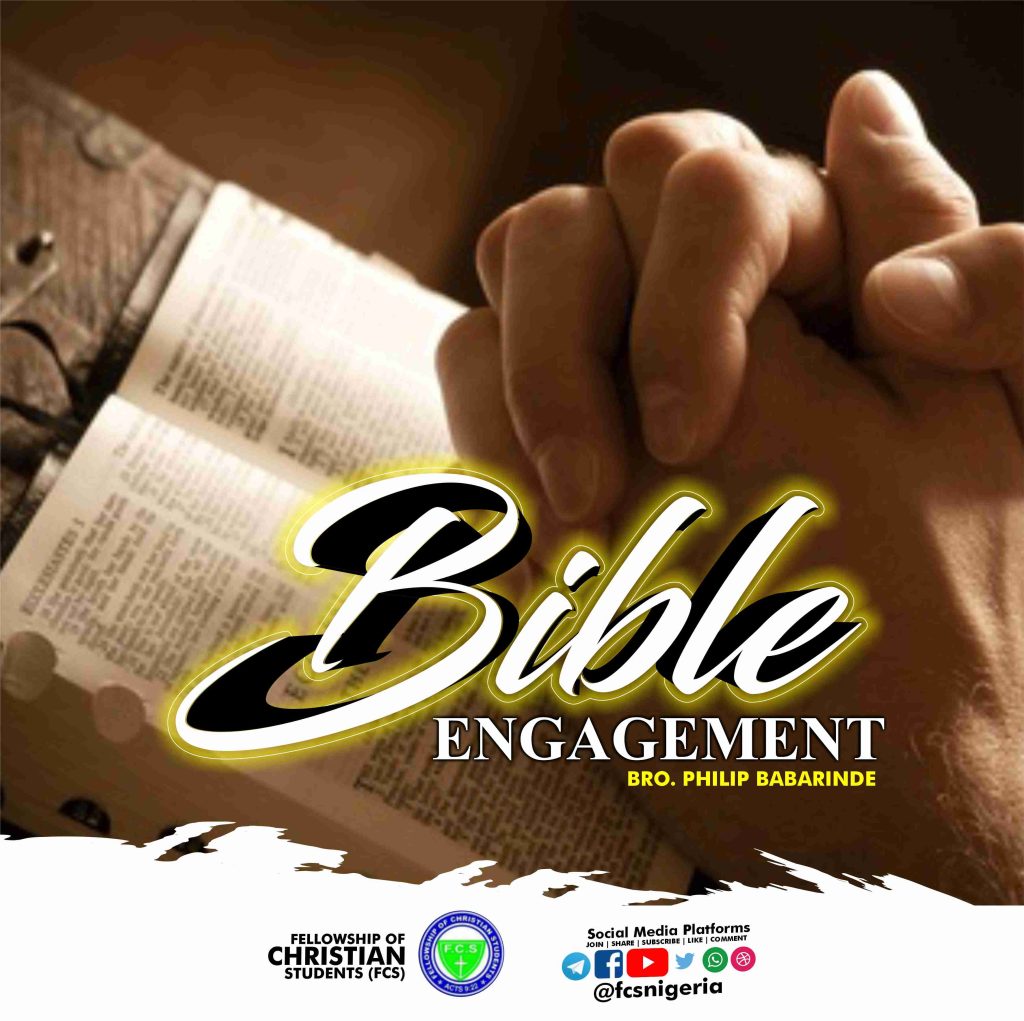
Background Texts: 1Tim 2:15; Deut. 4:2; Rev 22:19
Introduction: God has given us an assignment/work and he has also given us an instrument for the work.
- Why do we exist as an organization?
- What is the instrument of our ministry?
We are called to evangelize and disciple the student for Christ and the instrument
for doing the job is the Word of God – The Bible. We can read the word of God
without any fear of contradiction, the
Word of God is the pivot upon which our ministry rotates. So, in order to do
our assignment well and successfully we need to know how to use our God-given
instrument well. We need to know how to engage the word and apply it
correctly.

Bible Engagement
“From your personal experience, how would you define or describe Bible Engagement?”
-
Bible Engagement can be defined as
- The process of interacting with the word of God for the purpose of fellowshipping with God, knowing God, his will for our lives, and how we can live to please him.
- It involves reading, studying, and
understanding biblical text which results in hearing from God, and forming
a life-long habit of meeting and building a personal relationship with
Him. - It is connecting with God through his
word in ways that lead to spiritual enlightenment, salvation, edification,
nourishment, and progressive transformation in our lives. - It is more than mere reading or studying
the Bible to gain head knowledge. Rather in Bible engagement we read and
study the Bible with the desire and expectation that it will affect our
lives and change our nature. Correct Bible engagement brings us into
face-to-face encounters with the Eternal God through his word. And such
encounter never leaves us the way we are. - Bible engagement is our mission. It
drives us to mission and our mission is done through Bible engagement.

Our Bible Engagement Method
“Mention some essential steps in our FCS Bible engagement method”
FCS teaches and encourages an inductive approach to Bible engagement. That is we want each person to be able to discover for themselves what God is saying to them as they read and study the Bible. This involves the following six steps
- Pray: Human wisdom is not enough
- Read: slowly, several times, listening to God’s voice
- Observe: What does the passage say?
- From what you have read
- The main point in the passage
- God is …?
- Promise? – Thank you, God!
- Command/Warning? – Please help, God!
- Good example?
Use Fact Finding Questions (FFQs)
Who?
Where?
When?
What?
How?
Why?
So (Therefore)!

4. Interpretation – What is the main point?
5. Meditate/Reflect
- From what you have read
- The main point in the passage
- God is …?
- Promise? – Thank you, God!
- Command/Warning? – Please help, God!
- Good example?
- Bad example?
6. Apply/ Respond/Implement – What does it mean for me/us?
- Worship
- Repentance
- Obedience
- Trust
Our Bible Interpretation Distinctive
Mention some distinctive elements of FCS Bible interpretation.

-
As we read and study the Bible one major step to understanding and applying what God is saying to us is correct interpretation. In order to derive maximum benefits from our Bible engagement FCS believes and encourages that the Bible should be interpreted as:
1. Prayerfully, in humility, and in dependence on the Holy Spirit. We come to Scripture acknowledging that only the Holy Spirit can open our blind eyes and illumine our dark hearts to what God is saying. As God’s empowering presence, the Spirit will lead people to engage with the text and to face God’s challenge in the here and now. The recognition that the Holy Spirit brings a sense of immediacy will draw us into an understanding, not just of the original meaning of the text, but also of its contemporary prophetic significance.
2. Corporately rather than simply individualistically. We are the body of Christ. We stand in a line of historical interpretation that we respect, and from which we learn. As we engage with Scripture together, greater understanding emerges, fellowship is deepened and appropriation is encouraged.
3. As a whole. We are committed to the whole of Scripture, to allowing Scripture to interpret Scripture, and to promote the understanding of the broad sweep of God’s dealings with humanity from creation to new creation. In doing this we affirm that the Bible is a metanarrative; that is, it tells a story that gives meaning to all of life, and by which all of life must be judged. In terms of this metanarrative, we will emphasize interpretation both as propositional and as a response to this metanarrative, and help people to enter imaginatively into the biblical story, seeking always to lead them to live under its authority.
4. Contextually – as it was written. The Bible contains different literary forms (genres) and the way God communicates often differs from one to another.
Therefore interpretation includes recognizing and respecting the genre of each passage. The passage is then to be interpreted according to the author’s intention and in terms of its historical and canonical context. To the criticism that, however desirable this may be, it is unattainable, we assert that, while exhaustive knowledge of these things may be impossible, adequate knowledge is not.
- Contextually – as it is encountered. Our presuppositions, culture, gender, age, and personal history – in short, all that is going on in our lives and communities – always colour our encounters with Scripture. Every encounter is an interpretation. Nevertheless, we can know and experience scriptural truth; and while our communities exercise a significant influence on our understanding of Scripture, they are not ultimately a binding force.

- We need constantly to bring our understanding of Scripture back to Scripture. At the same time, we need to listen to the interpretation of Scripture of others who belong to different contexts, so that our understanding may be enriched and our blind spots corrected.
- Contextually – as it is lived out. Encountering God through his Word will have an impact on our lives, encouraging us in worship, mission, and holiness. As we commit ourselves to obeying God’s Word, our experience will help us to understand the Bible better, and deepen our faith in, and our fellowship with, God.
- Christologically. Jesus Christ (his birth and life on earth, his death and resurrection, his ascension and second coming) is God’s key Word in his dealings with human beings; and he, therefore, is the focus of God’s revelation in the Bible. Our basic aim states that meeting God through the Bible and prayer will lead to personal faith in Christ. The Holy Spirit leads us into the truth, always testifying to and glorifying Jesus.
In light of these things, in engaging with the Bible, we should consider how a passage ultimately relates to Jesus Christ.
8. Relationally: a meeting with God. We do not read the Bible simply to collect information about God. Rather, through the stories, promises, commands, warnings, and examples, we begin to understand God, meet with him, and know him personally. To attempt to interpret Scripture and yet somehow stop short of enjoying that relationship of love, is to miss the entire purpose for which God, whose nature is love, has revealed himself in the Bible.
God is a relational God, his character is to build and sustain relationships. So all our interpretation of Scripture is to be rooted in the two dimensions of our relatedness to God as his children, and of the web of human relationships around us.
Fundamentally, reading the Bible is about a relationship with God, and this can only be achieved by dependence on the Holy Spirit.
Concluding Thought: In the word of our Lord Jesus Christ, the blessing is not in knowing the facts but in doing/ practicing them (John 13:17). May our love for the Bible increase, our attitude to it improve, and our eagerness to obey what it says becomes better.

